"Into the DCNYU" - Renee Montoya keeps pushing Jace Fox in I Am Batman #13
I Am Batman writer John Ridley talks about Jace Fox's encounter with The Question and his plans for GCPD: The Blue Wall
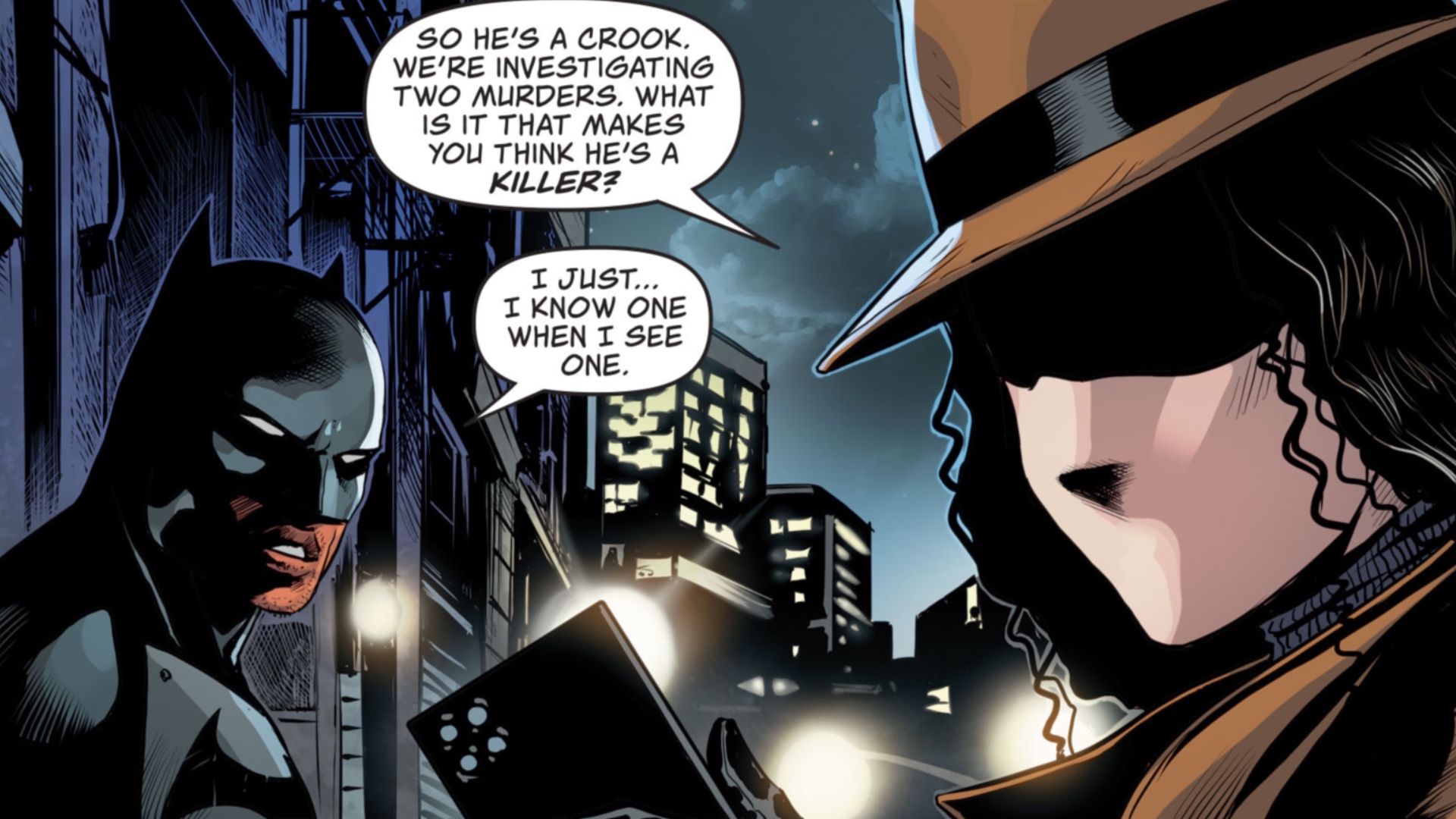
There's a lot of similarity between Jace Fox and Renee Montoya. They're both legacy characters. They've both struggled with their secret identities. And now, they've both been written by Oscar-winner John Ridley. Ridley, the writer of 12 Years a Slave and The Next Batman: Second Son, has written a Montoya/Fox partnership into the latest issue of I Am Batman #13, on shelves September 13th.
Ahead of the issue's release, Newsarama sat down to chat with Ridley about the pairing, but we didn't stop there. Ridley is also penning the upcoming Montoya-focused series G.C.P.D.: The Blue Wall, and we couldn't help but question him about that comic as well. Read on to hear what he had to say.

Grant DeArmitt for Newsarama: John, one of my absolute favorite things in I Am Batman #13 was the relationship between Renee Montoya and Jace Fox. They're partners, but they butt heads. Can you talk about their philosophies on fighting crime?
John Ridley: Renee Montoya is one of the greatest of the modern-era characters of the DC universe. Renee is a police officer, has always been a police officer, and she's now commissioner. Her approach to solving crimes is both as the Question, and as Renee. It's thoughtful, methodical, asking questions, getting evidence, being concerned with process and procedure. Whereas Jace's whole thing is that he just wants to solve a problem. You know, he wants to get in there. He's not, you know, a vigilante in the sense that he doesn't care about the law. One of the great things about comic books in general is people tend to have a moral compass, and we as readers trust that they're going to do the right thing.
But it is very different, yeah. One of the things I enjoyed about this arc is that Renee steps to Jace and says, 'Look, if you are going to be a version of Batman, you've got to be Batman. Batman is a detective. He's the world's greatest detective. It's not just about getting in people's grills and punching evil, but you’ve got to ask the questions. You've got to prove things. You can't make assumptions. You may not like this person as a person, but that's different than proving they committed a crime.'
So what I like is that Jace is wondering, all of a sudden, 'Am I being watched?’ Here's this person who's known as this enigmatic Question who almost gives him a kind of test. And that changes things. If you're sitting around and you're not being watched, you'll do anything. The minute somebody is watching you, you adjust your behavior. You ask, 'What do they think about me?' It's so interesting for me, after a year [on the comic], to now put Jace into the spotlight and have him question all the things that he's learned, all the growth that he thinks he's done. How does that compare to this particular hero now coming into his sphere? Into the DCNYU.

Nrama: Is that the DC New York Universe? I love that.
Get the best comic news, insights, opinions, analysis and more!
Ridley: You know, I can't say it's really a thing, but it's a thing for me.
Nrama: I mean, we're going to treat it like a thing. "DCNYU, trademarked this article."
Ridley: You'll be the messenger taking it out. Totally.
Nrama: Great. But yeah, Montoya’s relationship with Jace comes through so well. It's not exactly a mentor relationship, but like you said, she's a challenger. She's there to ask, 'Are you sure?' I think that’s very cool.
Ridley: That's certainly what I wanted you to arrive at when you finish [I Am Batman #13]. Jace is ready to hit some people and all of a sudden Renee shows up and it's like, 'Okay, you're asking me to solve a crime from the past that is tangentially connected to you. You've got to ask the right questions.'
No pun intended.
Nrama: Of course. Ok, let's go back to something you brought up: Jace's identity as Batman. There's a panel on the first page of Issue #13 where Jace says "I became a Batman," and that stuck with me. He doesn't say, "I became Batman," which is interesting because the title is I Am Batman. He says, "a Batman." What's the thought behind that? How does Jace see his Batmanness?
Ridley: Jace kind of stumbles into being Batman. He doesn't know that Batman is Bruce Wayne. But he knows his dad was working for what he thinks is this conglomerate that built this hero. He thinks of Lucius as the tech genius; Bruce as the billionaire funding this. [He thinks] it's a Batman built to protect the rich and the powerful, first and foremost.
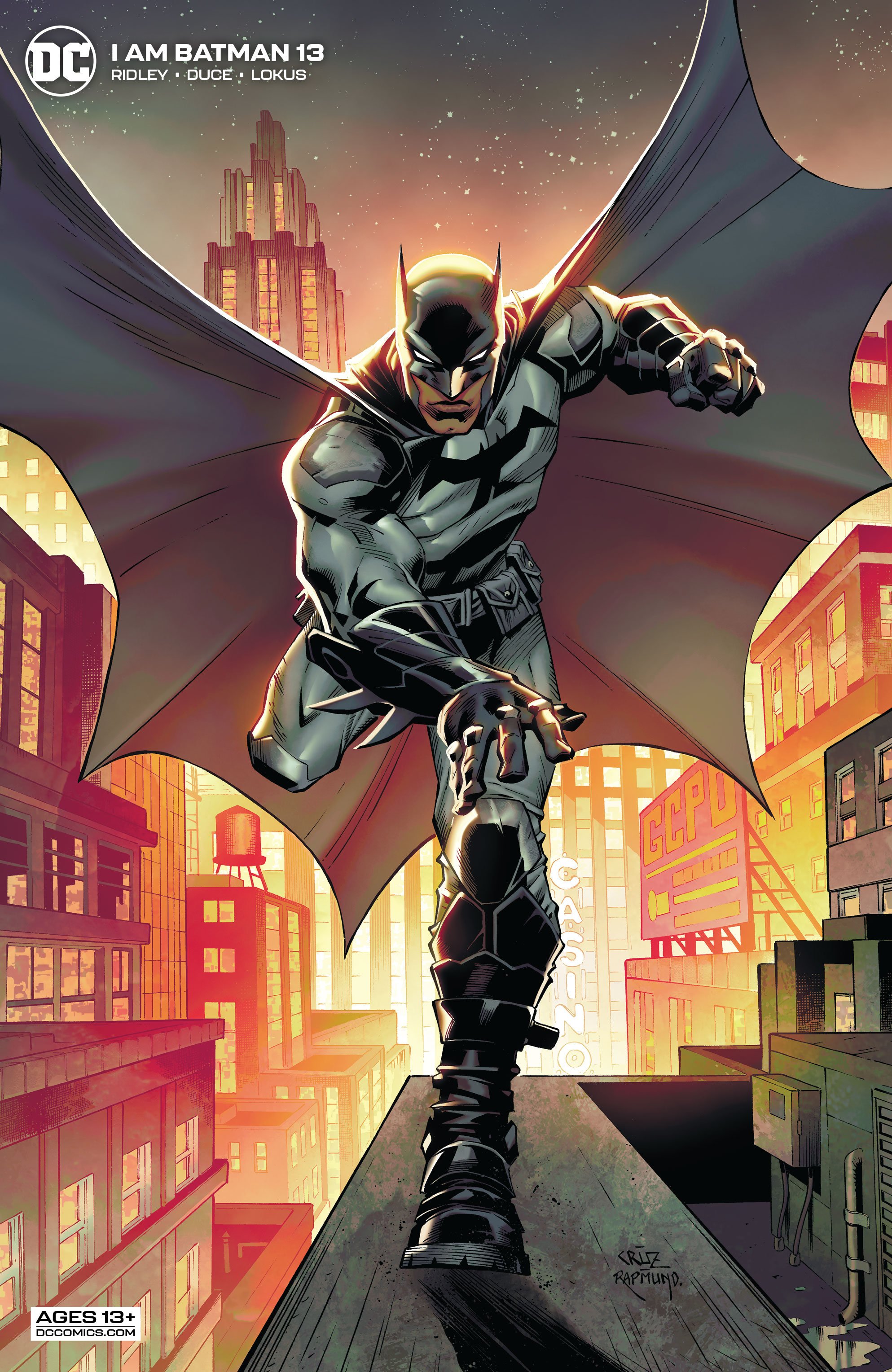
You know, Jace is a young man. He bristles against certain traditions, certain things that have been out there. He was always like, 'if I'm going to take this and appropriate this symbol, I've still got to make it my own.' He wanted a Batman that was present, not this guy who just comes out at night. Bruce banks on the mystery, on putting fear into the hearts of evil and things like that, and Jace wants to be this guy people see. He inspires people, particularly BIPOC individuals that can go out and make a difference. He can fight bad things, he can stand up for something.
I think he realizes – particularly in the arc now, where he's reconciled with his father – that it's not as easy to affect change as he thought. That the other Batman is really doing things. So he doesn't want to deny Batman. He doesn't want to pretend the other Batman doesn't exist. There are even points where he acknowledges, 'I don't hate on the Batman anymore. I don't hate on him… but I've still got to be my Batman.' There are times, and I hope I don't overuse it, where he really does say, look, 'I am Batman.'
To me, it's like the presidency. The office endures. But the people who come into the presidency, they have to make it their own. They have to represent and lead the way they see best. I might agree, I might disagree, but they've got to go out and do that thing and then leave their mark. So, yeah, Jace is not Batman to the exclusion of other people. He's saying "I am a Batman" in, hopefully, a more mature sense. There's a point coming up, where he does talk about being not the first to wear this outfit and not the last.
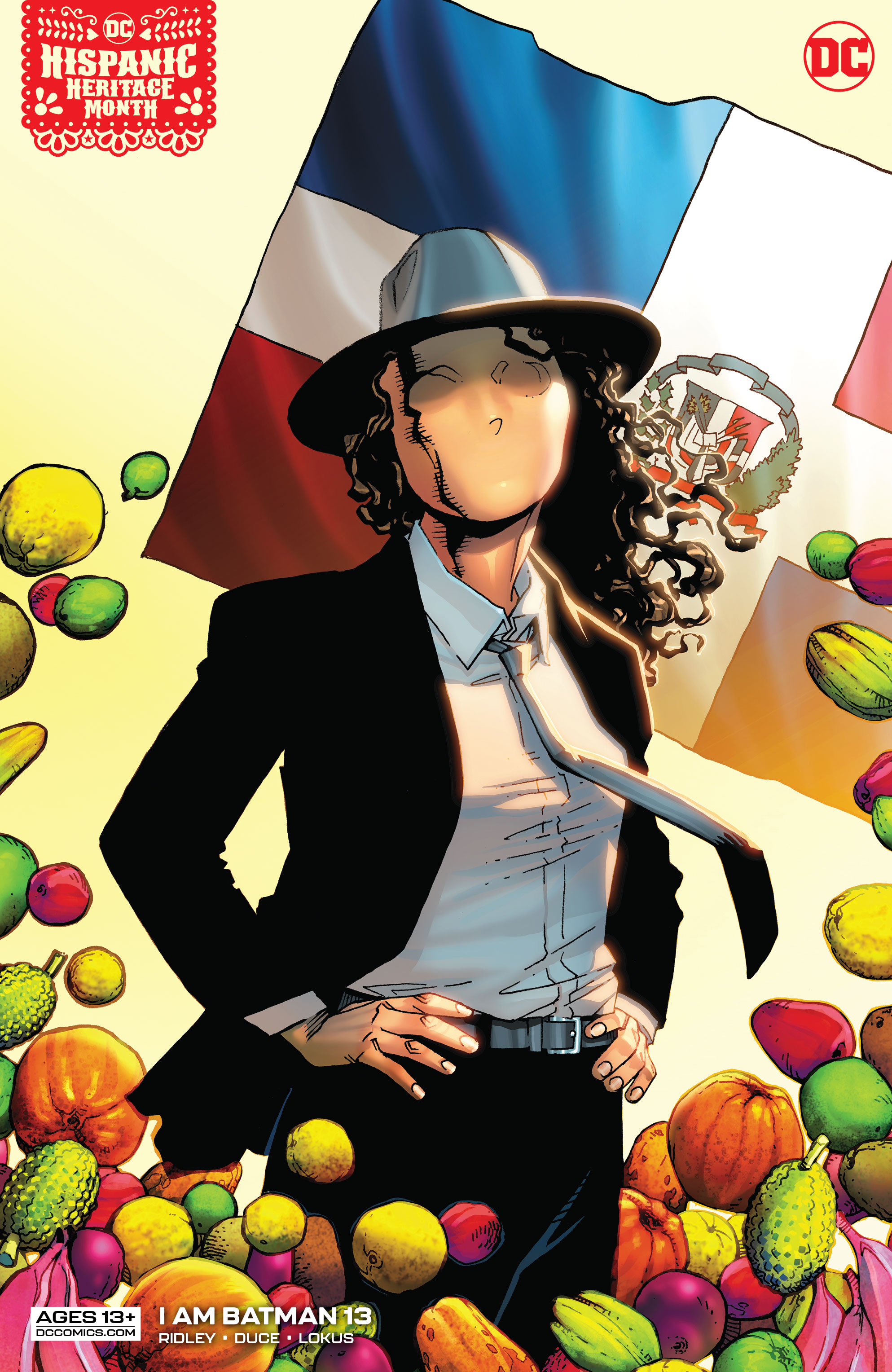
Nrama: What a way to put that – being Batman is like being president. Well, I could talk about Jace Fox for hours, but I do want to get back to Renee Montoya. Because not only is she in I Am Batman, but also your upcoming book, G.C.P.D.: The Blue Wall. How is this arc of I am Batman going to change how Renee Montoya looks at the police?
Ridley: I'll be honest: It's less about how she looks at the police and more about how she looks at where she fits into Gotham City as a police officer. I'm old enough that I remember seeing her just as a background character on Batman: The Animated Series. And going from that, from being a beat cop, to being a detective, to being on major crimes, to being commissioner, to being as high as you can go within her field. Just like anybody else, she’s asking, well, what do you do?
I'm trying to avoid spoilers, there is something that happens at the end of this arc where Renee makes an active decision about her future and about the future of one other individual. That, right now, is maybe a little slightly off the radar, but it's going to very much resolve by the time this ends. There's going to be one little phrase, one little thing where she says, 'this is why I have to go back to Gotham.'
So it is less about contextualizing policing and things like that. It's about her testing herself, like she's testing Jace, and asking, 'what’s my role as a hero?' And 'how does that compare to the needs of a society?'
You know, I come from a family of service. My dad was in the Air Force. My mom's a teacher. I respect service as a person of color, as a black man in America. I understand that relationships between police and communities are fraught. So Renee has a lot to deal with. Is it more effective for her to deal with that in New York? Or, ultimately, is there a way to really deal with things that she needs to deal with in Gotham City? That's what this arc really gets to.
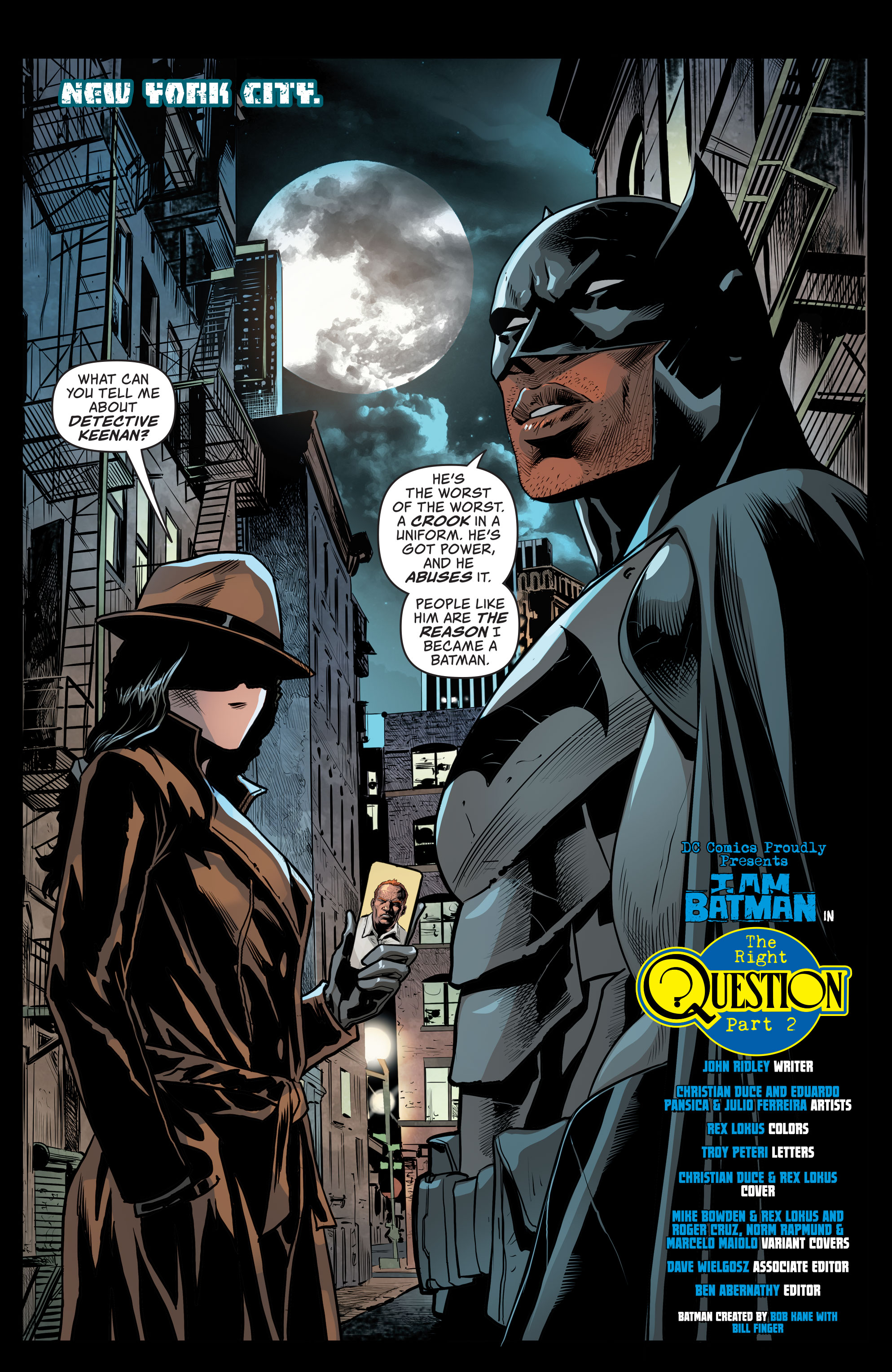
This arc, and really, I Am Batman, is about transition. Jace is transitioning towards, again, his own particular Batman. His sister, Tiff, is obviously making a transition. I think everybody knows where that's going. Renee makes an emotional transition. And being able to introduce her as the new commissioner in Second Son… to me, I could not be happier with what DC has allowed me to play within these stories. I hope the reader feels that Renee is really going to another place. Any time you're dealing with these legacy characters, you know, you've got a responsibility because people loved and cared about the writers, the artists, the editors through these years. What I hope for is to take Renee and just continue to elevate her as a character.
That's another reason I love her. How many real-life, fundamental people in the entire DC Universe do you know? You know, your Lois Lanes, your Perry Whites. Jim Gordon has kind of stepped aside right now. How many folks like that can you talk about and go, 'Oh, I know that character!' Renee is one of those people and I'm super sensitive to being honorific to her past and present and setting up her future. Whoever comes in and writes the next story, they've got to make a Renee that's even more durable, even more well known, even more finely detailed than, you know, when I had the opportunity to work with this amazing character.
Nrama: Your respect for the character is so evident. Now, Renee's mission in The Blue Wall is going to be police reform, which is something many people are frustrated to not see in the real world. As a writer, do you think it's more important for a fictional world to be what we hope ours could be, or to reflect our world as it really is?
Ridley: With Blue Wall, it's more important to write about what is actually happening, but not in the sense that you could read this and then a newspaper and get a one to one picture of reality. In some ways, that's too easy, and issues of policing are way too complicated. They're very complicated. A couple of years ago, the big headline was, 'Defund the Police.' Right now it's, 'Crime Is Out of Control.' And it's like, okay, well, do we need these folks or not? Then in the middle of that, you've got men and women who got to go out every day and live the headlines.
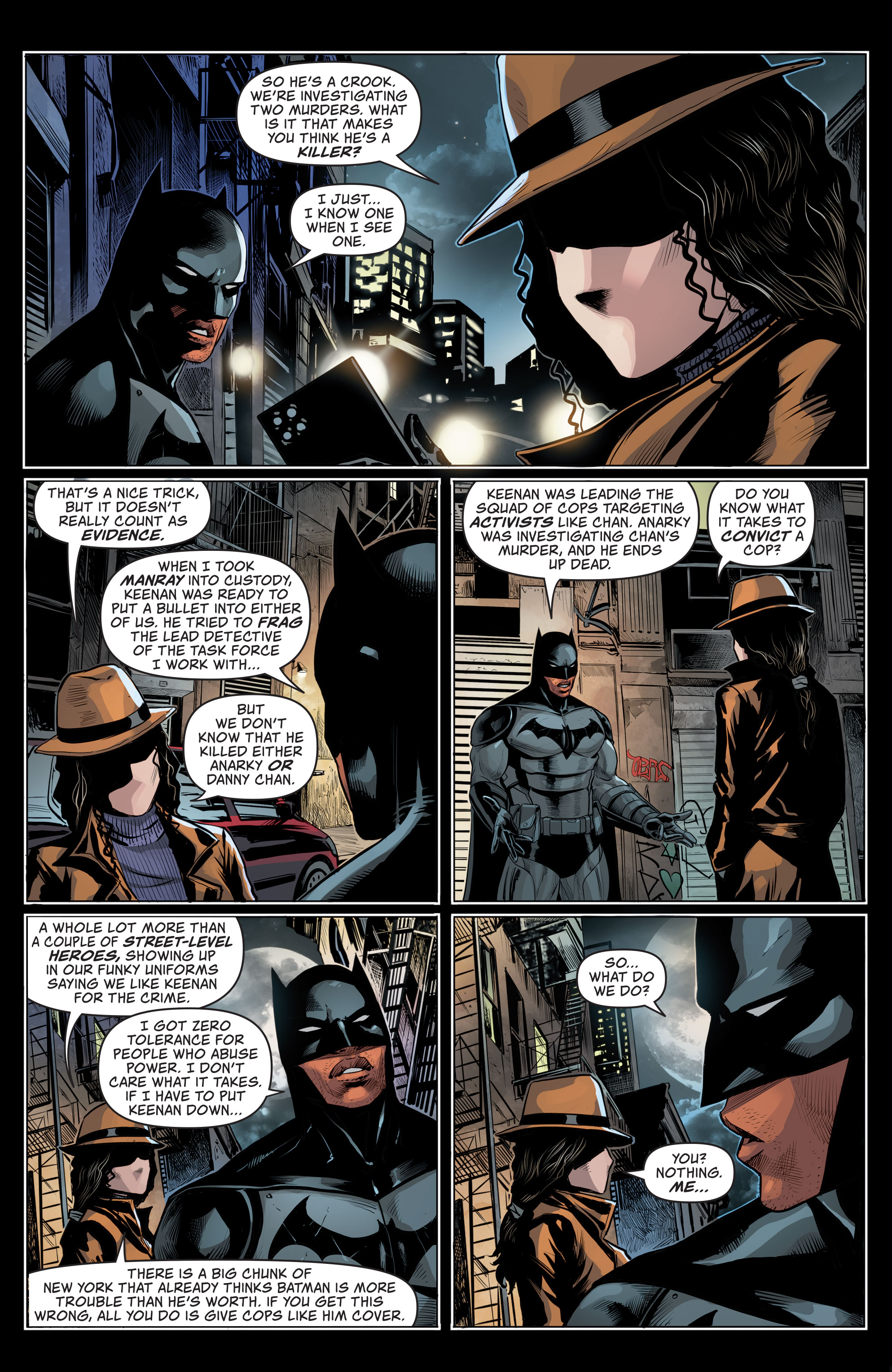
When you're talking about police reform and if it can be done, one of the things that I really find kind of fascinating as we talk about obviously over the past few years is the interactions between black people and largely white officers. That's a very important conversation to have, there are no two ways about it. But to me, it's bigger than that, because we still treat race in America as being binary. You know, it's black and white. But we've got folks, and certainly officers, of every background, every demographic, who are being put into systems that are still behind the times, trying to police in a modern space.
Exactly to your point, it's one thing to say 'police reform,' but that's really general. What does that mean? How do you do it? How do you take the need to bring people together, irrespective of their backgrounds, and police? You realize, we all also have to be individuals, but it's difficult to separate ourselves from our demographics, our backgrounds, our education, our regions, our socioeconomic backgrounds.
To me, the Blue Wall is an opportunity to step back, it's [asking], 'How do you do all of these things and still come out at the end of the day with the law followed? With people, citizens respected? Officers appreciated?' How does anybody do all that? And for me, the Blue Wall is the opportunity to ask these very difficult questions, to represent it with some familiar faces, and treat it like the real world.
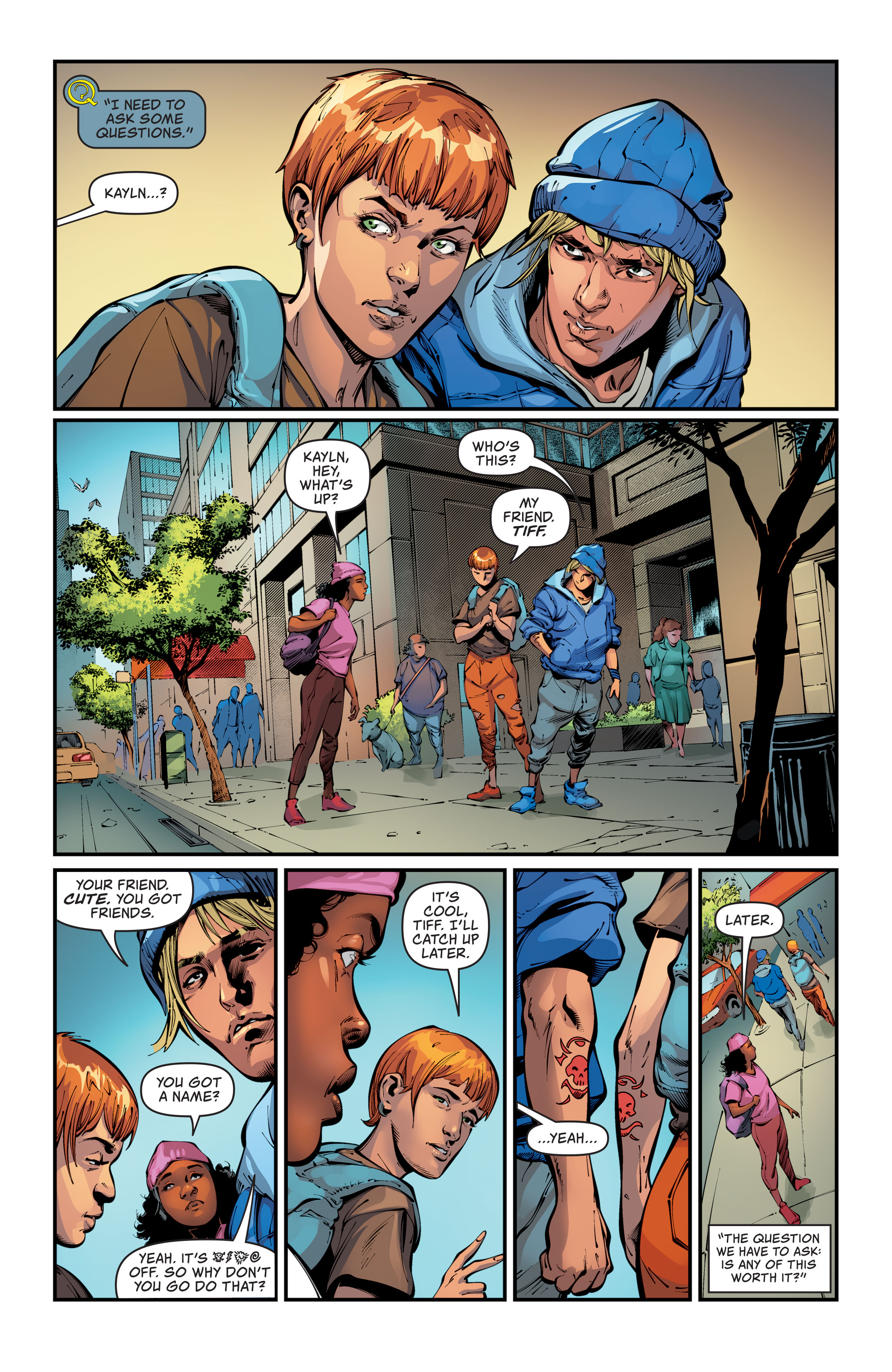
But in the comics world, well, nobody cares if Batman beats the crap out of Joker. They say, do it, get that guy. You're going to get the Riddler? Take him out. But a regular police officer doesn't have – in a comic book space – doesn't have the latitude to just go at the bad guy and take him out or whatever. You've still got to, you know, arrive in court. You've got to testify. You've got to follow the letter of the law. You've got to make split-second decisions. It's tough.
Coming back to your question; do I write about the future that I want? Yeah. But the beautiful future that all of us would like in terms of policing, community, crime, all of that – it only happens if we actually are part of that systemic change. So for me, I hope people come into Blue Wall with this idea that it's just about reforming the police department. Which, yes, but that's very general. So it's, 'How do you do it with young officers? And more importantly, how do you deal with young officers?' Look at Renee's arc, if Renee was a real person. You go, 'Oh my God, this young Latinx beat cop went from just being a cop on the street to being open about her sexuality to rising to the highest ranks. If she can do that, maybe I can do it.'
It's one thing as a cop of color to look at a Jim Gordon and say, 'Okay, well, he's out of it. That's what I'm railing against, that old school type of policing.' If I'm young and black or Latin or Asian, I can go, 'Okay, I respect Jim Gordon for what he's done, but I want to take it in a new direction.'
Then look at Renee Montoya, and say, hey, she's representing the traditionally marginalized, but at the same time, if she's part of a system, what does that mean? What I love about this series is there's an opportunity to ask some big questions, to tell a story that hews close to reality, to do it in a way that's still really engaging and surprising, and do it in a way that to me is most important in the graphic novel space.
Trust me, [Blue Wall] is going to go places where people say, 'Oh, it's John, it's reality. I get it. It's going to be this, it's going to be that. It's going to be wagging a finger at this, straightening up in this.' But DC as a company is just very graciously allowing me to do great things with storytelling. The Blue Wall is probably one of the things I mean, honestly, one of the things I'm most proud of.
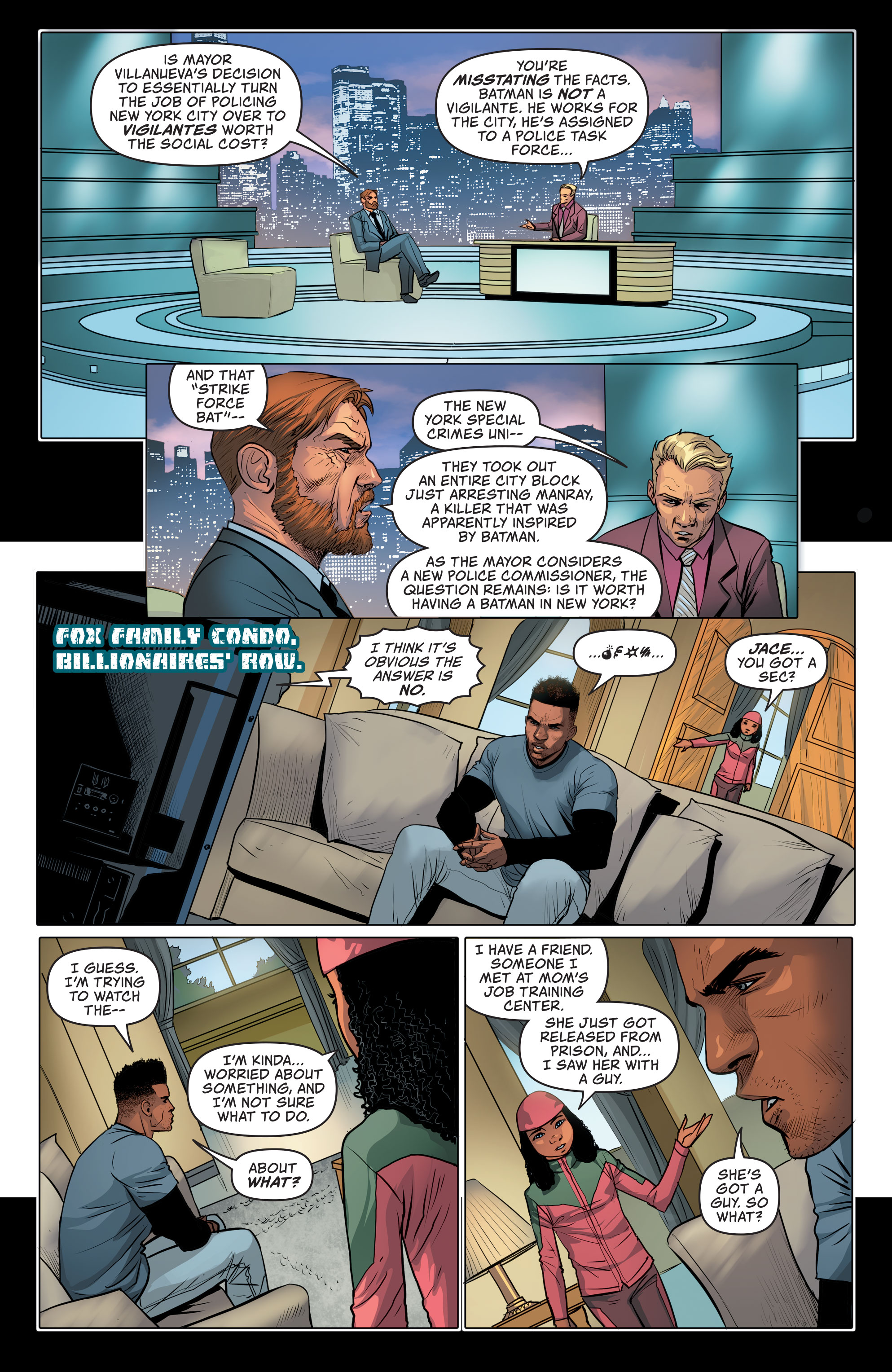
Nrama: That’s awesome. I’m sure that comes through.
Ridley: And I don’t want to give it away yet, but it mirrors a very real story in policing.
Nrama: Oh really?
Ridley: Yeah, one of the most incredible stories. I can't wait for you to look it up and go, 'Oh my God, this thing actually happened.' Because it's based on something very real. And Stefano Raffaele's artwork is off the hook. It is incredible.
Nrama: Very cool. So will Blue Wall be pretty grim, then, since it's based on a real story? Usually, when people talk about injecting reality into comic books, they're making them darker.
Ridley: For me, it's not the grim, it's the gray. When Watchmen came out, and Dark Knight was right around that same time, those were 'realistic' comics. But for me, the series around that time that was the greatest was actually the Denny O'Neil's and Denys Cowan's Question series, because it was all gray.
In the first issue, Vic gets his ass kicked by Lady Shiva – gets beaten up, shot in the head, and dumped in the river. And you're like, okay, this guy's a hero? I thought they were supposed to win the fight. And in almost every issue of The Question, and there were 36 issues not counting the Annuals, he didn't necessarily save the day in the end.
When we read comic books, even now, we want that escapism. We want that heroic moment, the hero getting up off the ground and going, you know, I'm not down. I don't care what anybody says. I'm going to fight. I'm going to win. We need that. But at the same time, we have real lives. The victory isn’t as big, and you have to keep living anyway. You know, we made the movie, but it flopped. But still, there was one person who really liked it. So that small difference, that's the gray. It's not the grimness of, 'No one liked the movie.' It's the gray.
You know, for a universe that's set in mythical spaces, there's an incredible amount of reality going on in DC. It's that grayness that to me really makes the difference.
Nrama: Awesome. I think that’s a great place to end, this has been a phenomenal conversation.
Ridley: Thanks, it's been fun. I've been very fortunate in my career, in a lot of the things that I do. But I've got to tell you, writing graphic novels, I feel like my life is coming full circle. I love what I do. My kids are actually interested in what I do.
And honestly – just going back to I Am Batman for a second – to have all kinds of people, particularly young people of color going, 'Oh my God, it's so amazing to see us represented and see us as part of this, just to see it all.' It just gives me joy. I love what I've done in other parts of my career. Nothing compares to being part of the Batman family. I don't know if I'm yet considered part of the family, but the folks out there who are writing and doing graphic novels and the ecosystem around that are on a different level. I love, love, love being part of this.
Will I Am Batman go down as being one of the greatest entries into the Bat-mythos of all time? It’s got some stiff competition, as Newsarama’s list of the best Batman stories proves.

Grant DeArmitt is a NYC-based writer and editor who regularly contributes bylines to Newsarama. Grant is a horror aficionado, writing about the genre for Nightmare on Film Street, and has written features, reviews, and interviews for the likes of PanelxPanel and Monkeys Fighting Robots. Grant says he probably isn't a werewolf… but you can never be too careful.


